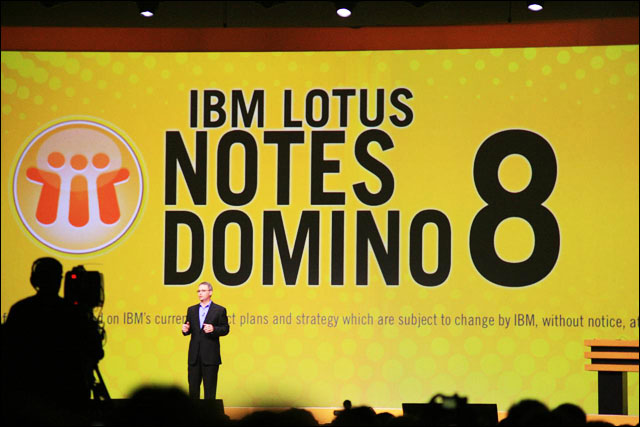Financial services giant AMP this afternoon revealed that it would ditch its Lotus Notes/Domino installation as part of a shift to Microsoft’s Outlook/Exchange platform hosted by CSC Australia.
The shift to a hosted platform was revealed this morning in a CSC statement touting the strength of its Australia-based cloud computing offering. But responding to questions this afternoon by email, AMP IT director of service management Sharmini Sivathas said it wasn’t a simple Exchange to hosted Exchange migration.
“AMP currently uses Lotus Notes managed by CSC,” she said.
The revelation adds AMP’s name to a long and growing list of large Australian organisations which have over the past several years revealed decisions to dump IBM-owned Notes for Microsoft’s platform – and sometimes Google’s Gmail.
In February it was Qantas confirming it would migrate off Notes. Just the month after it was Monash University phasing out Notes and switching to Gmail. And in June the newly formed Department of Human Services confirmed plans to end its long-running relationship with the troubled IBM platform.
There are some IBM customers in Australia who continue to be happy with Notes — such as Australian youth charity BoysTown, which recently decided against Exchange or Gmail and instead upgraded its Notes installation – but in general there have been no large new Australian Notes customers reported for some time.
Sivathas said the cloud email migration came about because AMP had been undertaking a review of its email, productivity and IT collaboration tools.
“Recent changes in the enterprise mail market, have created opportunities both in terms of cost and functionality which aligns to AMP’s collaboration strategy,” she said. “AMP has evaluated and piloted a number of cloud and on-premise email offerings, and found that CSC’s Microsoft offering best suits AMP’s needs.
The executive said AMP saw productivity benefits in being able to provide its staff with an email system that was “more tightly integrated with other desktop productivity tools”. In addition, financial benefits were a “key consideration”. The financial services giant has more than 3,500 employees and also works with more than 2,000 financial planners in Australia and New Zealand.
CSC was picked for the rollout, Sivathas said, because it had been AMP’s infrastructure partner for over 10 years, and was familiar with AMP’s environment and the financial services giant’s specific needs.
Image credit: Aidy Spencer, Creative Commons


Cue the IBM employees feigned outrage “But it’s soooo much more than just email!”.
I only just noticed your Boystown headline Renai – very clever! :)
Non-IBM Employee: it *is* much more than e-mail.
Its biggest lack, as is often the case with Microscoffed competitors, is that its vendor failed to throw its weight around sufficiently to offset M’s guerilla tactics – including well-known failings in publicity.
No way. It’s biggest lack is a user friendly client interface. I spent some time working in a >6000 seat fed dept, and this was the single biggest gripe of users for the entire SOE, period.
Nothing changed over the years:
IBM – a software company that sometimes makes marketing.
Microsoft – a marketing company that sometimes makes software.
And Google a company that leads people to a dead end
http://www.smh.com.au/technology/technology-news/its-a-wipeout-for-google-wave-20100805-11igi.html
Not that I want to defend Google but ….
1. It takes guts to admit that the market isn’t ready for your product and pull it. Remember that IBM did the same thing with Workplace. They didn’t do it with OS/2 and it cost them a lot. Arguably, it cost them their leadership in the field. Similarly, Microsoft didn’t do the sensible thing with Vista (and ME) until they’d lost way too much market share.
2. Google’s statement says that they’re not intending to continue developing it as a standalone product. It also says that the innovation will be redeployed. I think you’ll see wave features popping up in Gmail and Google docs soon. Again, IBM did the same thing – Notes 8 is full of Workplace features.
3. I don’t think that Wave was ever a released product. Wasn’t it always in Beta?
I suspect that the innovation of Wave will eventually find its place in the mass market in some shape or form. It will also be interesting to see what happens to IBM’s Project Vulcan which is amazingly similar and, I think (?) contains shared code.
In all honesty, if you’re only using Lotus Notes for mail, then there really isn’t a good reason to be on the product (aside from the obvious fact that it’s much more secure than the MS Alternative). IMHO, a forward–looking company who intends to make an email switch would be better advised to use a cloud service like Gmail (or if you stay on IBM, LotusLive). Microsoft’s cloud platform is horrendous – so I’d avoid that at all costs.
Of course, if you’re using Notes for more than mail, then it doesn’t make business sense to switch. As everyone says, it’s **SO** much more than email – but of course, only if you’re using the extra features.
Gavin and others…………clouds can just blow away……………I read this and realise it depends on the weather and we cant even forecast that!
http://www.smh.com.au/technology/technology-news/its-a-wipeout-for-google-wave-20100805-11igi.html
Also AMP have hundreds of Lotus Applications to be migrated for millions of redevelopment dollar cost and at a time when their share price is falling they believe email change will make things rosey!!!
http://www.asx.com.au/asx/research/companyInfo.do?by=asxCode&asxCode=AMP
They have their head in the Clouds for sure. Google, Microsoft or Lotus….who cares just deliver a profit for shareholders first.
Comments are closed.